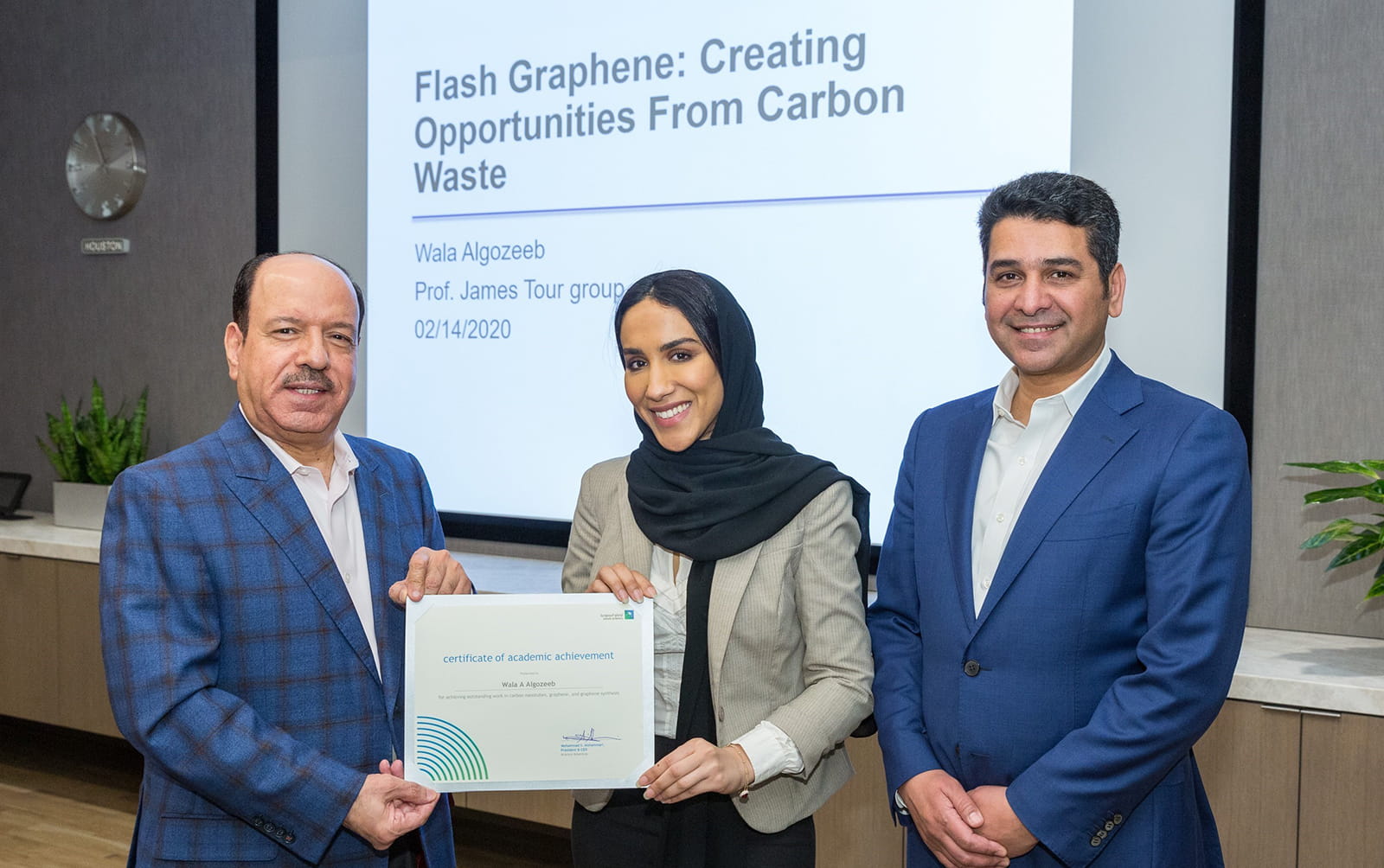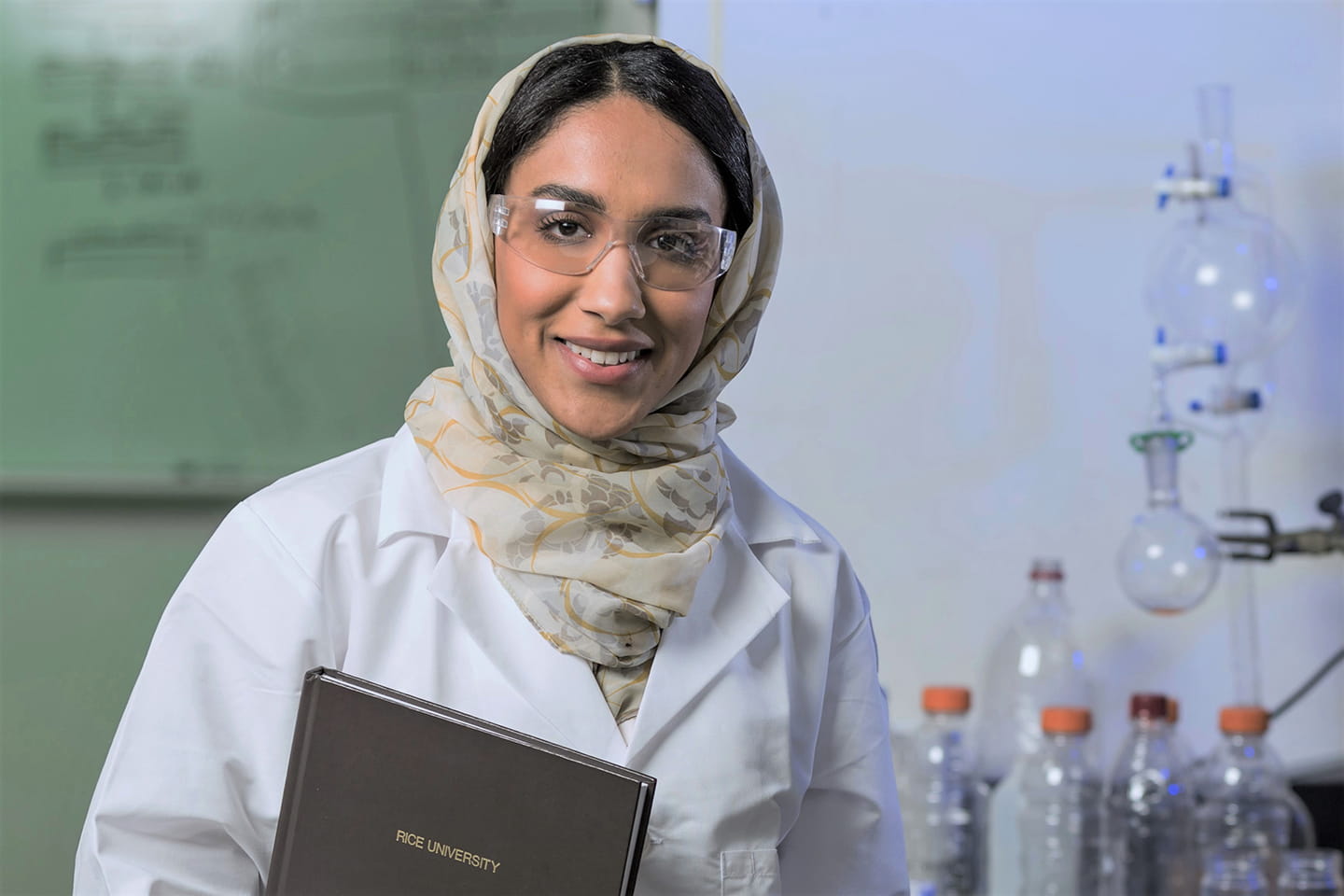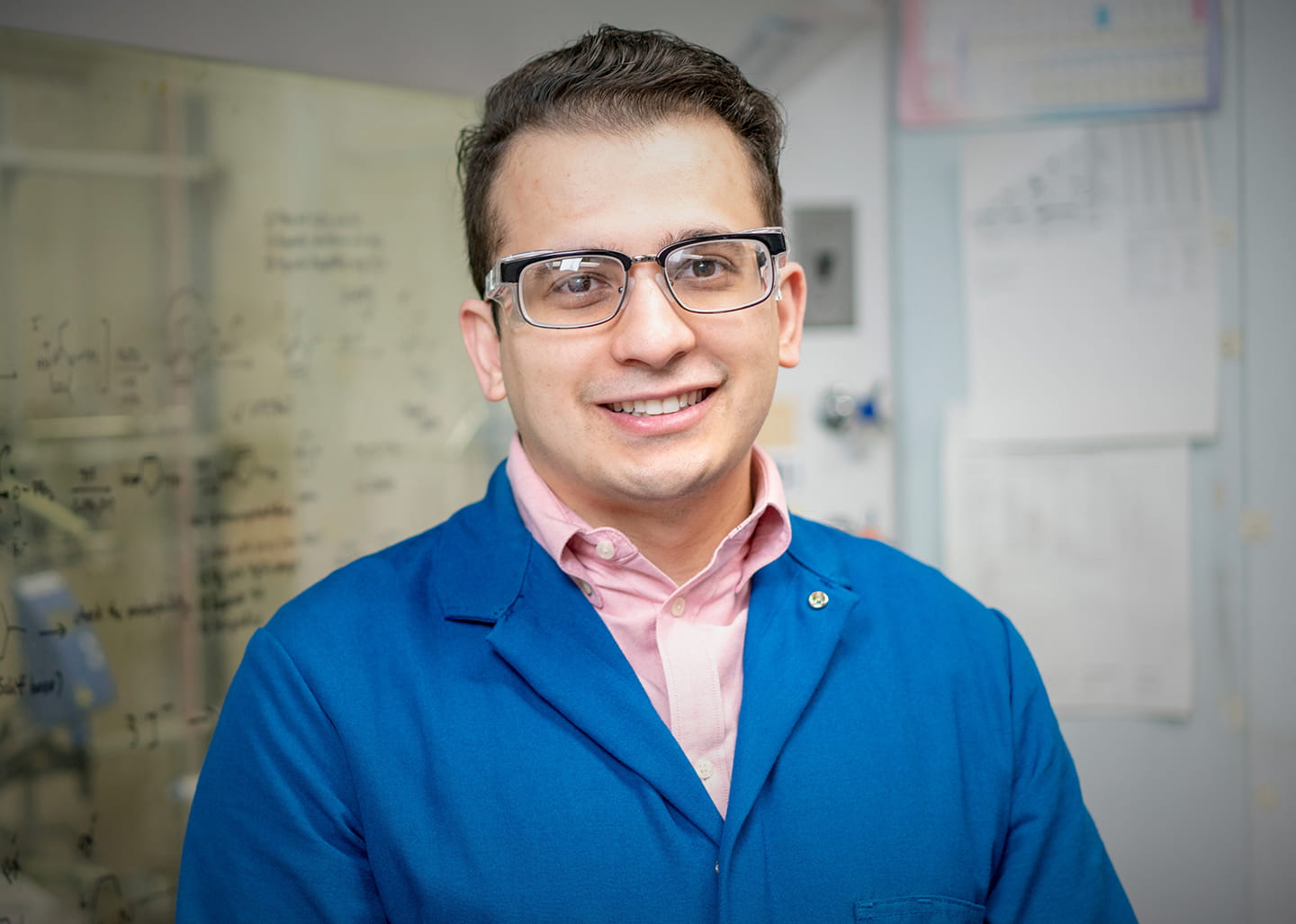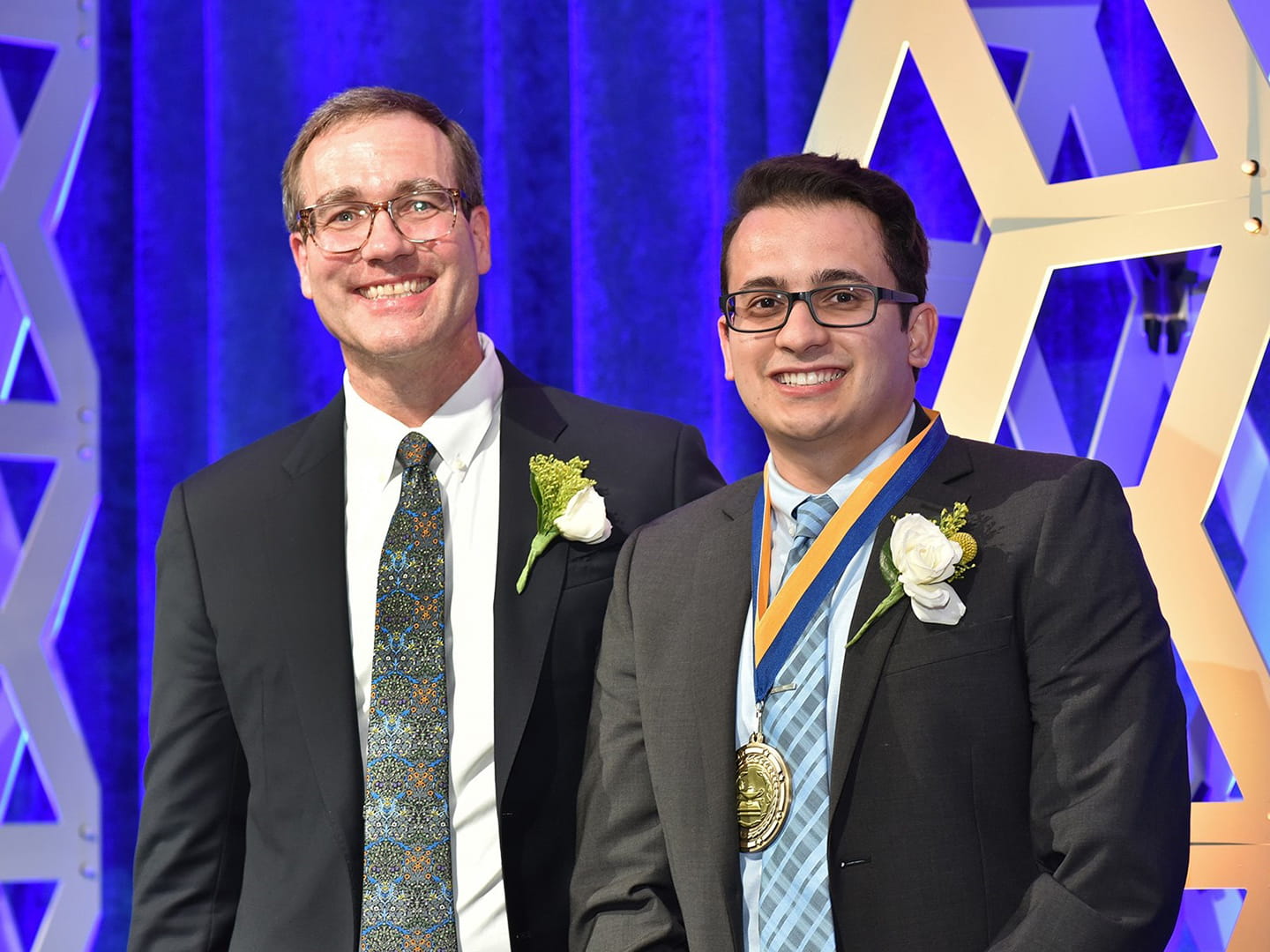Aramco’s doctoral students in U.S. recognized for outstanding research in energy sustainability

Wala Algozeeb received a Certificate of Academic Achievement from Aramco Americas President & CEO Mohammad S. Alshammari (left) for her ”outstanding work in carbon nanotubes, graphene, and graphene synthesis.” Mishari Utaibi (right), administrator of the Human Resources Academic & Technical Program Division, Aramco Americas, is also pictured.
Aramco is sponsoring more than 200 graduate students in the U.S. during the 2019-2020 academic year, with 55 of them pursuing doctorate degrees. Two of these doctoral students were recently recognized for their outstanding contributions in university-based research, with promising applications in the energy and chemicals industry.

Wala A. Algozeeb is a doctoral student at Rice University in Houston.
As a world energy leader, Aramco is committed to maintaining a strong, diverse workforce of men and women – talented, dedicated and enthusiastic about their role to provide the world with clean, sustainable energy.
Wala A. Algozeeb
Wala Algozeeb is a doctoral student at Rice University in Houston, seeking to broaden her knowledge in chemistry.
Algozeeb began working with Saudi Aramco’s Research & Development Center (R&DC) in 2012, where she took a position as a lab scientist to help solve energy challenges and assess new technologies. In collaboration with the R&DC team of scientists and engineers, she sought ways to customize a catalyst to crack heavy oil – which is basically of no use in the industry – and converting it, she said, “to a lighter petrochemical that is incorporated into our daily life.”
With an interest to further her education, she applied for and won a spot in the company’s Advanced Degree Program. Since starting her research at Rice University, Algozeeb has worked under the guidance of the school’s chemistry department, with a focus on nanotechnology and synthetic organic chemistry. She has carved out her own research niche in this area, seeking to lower industry’s carbon footprint.
Algozeeb is already gaining international recognition for her work as part of a trio of scientists who have recently discovered a new cost-saving process in the production of graphene, a one-dimensional carbon-based composite used in everything from cement to car bumpers, to drugs synthesis.
“We were working to design a different catalyst using a flashing method – and accidentally made graphene,” she admitted. The idea originated with one of Algozeeb’s colleagues, she said, who did most of the setup assembly using high-powered capacitors while collaborating on the chemistry involved.
Algozeeb’s role in the process has been vital, as she is the sole chemist in the trio, providing the expertise for all the composite work and plastics conversion to graphene.
Scientific journal Nature features graphene breakthrough
The team’s findings were published in the scientific journal Nature in January 2020. Although graphene production is neither new nor isolated, Algozeeb’s research stands to change the way industry looks at making graphene available.
She explained that, traditionally, all the methods used for graphene production have been very energy intensive and not economic. The flashing method Algozeeb’s group has devised can potentially convert cheap waste into high-quality graphene at bulk using minimal electric energy.
Algozeeb said the developed technology offers Saudi Aramco opportunities in multiple arenas including petroleum coke upgrade and fuel de-carbonization. It allows for the use of fossil fuels with zero carbon emissions by decomposing the hydrocarbons to hydrogen gas – a clean fuel – and amorphous carbon, that can be converted to graphene with limitless applications.
Algozeeb said the research is very exciting, “with huge potential” to benefit the chemicals sector. “My goal all along has been to do more for Saudi Aramco, to further its position as a technology leader. It is my hope that this new breakthrough will indeed help fulfill that goal.”

Faisal H. Alshafei is a doctoral student at the California Institute of Technology (Caltech) in Pasadena.
Faisal H. Alshafei
Faisal H. Alshafei, a doctoral student at the California Institute of Technology (Caltech) in Pasadena, is also working on advancements in the chemicals sector.
Alshafei, a chemical engineer, is collaborating with his fellow student researchers to answer a critical question: “How can we efficiently make light olefins, that is, ethylene and propylene, from methanol while controlling how much is made of each chemical?”
This question addresses even larger, more complex areas of chemicals research that Alshafei observed as a new employee with Saudi Aramco's R&DC.
As a doctoral student at Caltech, Alshafei said his research assignments are allowing him to learn new lab techniques, explore processes, and develop materials focused specifically on solving problems in energy. He added that a more traditional advanced degree program probably would not have afforded these opportunities.
Alshafei's ingenuity through the years has garnered attention. With just the right pluck, Alshafei became involved in five patents before he began pursuing his master's degree, sponsored by Aramco, in 2016 at the University of California, Los Angeles (UCLA).
“I worked on a lot of projects during my master's program,” Alshafei said, “but the common theme was electrospinning.” For Alshafei, electrospinning (a synthesis technique) became a way to produce fiber-like nanomaterial with diameters smaller than 100 nanometers (about 1,000 times smaller than a human hair) to be used in various sorptive applications.
Alshafei said he found himself in a unique role at UCLA, as “no one in our group had any experience in terms of electrospinning.”
In one such application, these materials were used to capture carbon dioxide in a process called sorption-enhanced steam methane reforming, which aims at producing hydrogen without any carbon dioxide as a by-product.
Academic recognition
Alshafei has authored four technical papers so far and more are in the works. He also just received the prestigious “Edward K. Rice Award for Outstanding Master's Student” from UCLA for his exceptional work while there earning his master's degree.
Alshafei said he remains grateful to all his school mentors through the years – especially those who were there at the very beginning of his academic career whom, he described, “saw his potential and took a chance” on him. “For that,” he added, “I am very grateful.”

Faisal H. Alshafei received the “Edward K. Rice Outstanding Master’s Student Award” from UCLA for his exceptional research work while there as a student. UCLA Prof. Richard Wesel presented a medal to Alshafei, right, at the official awards ceremony held Feb. 22 in Los Angeles.



